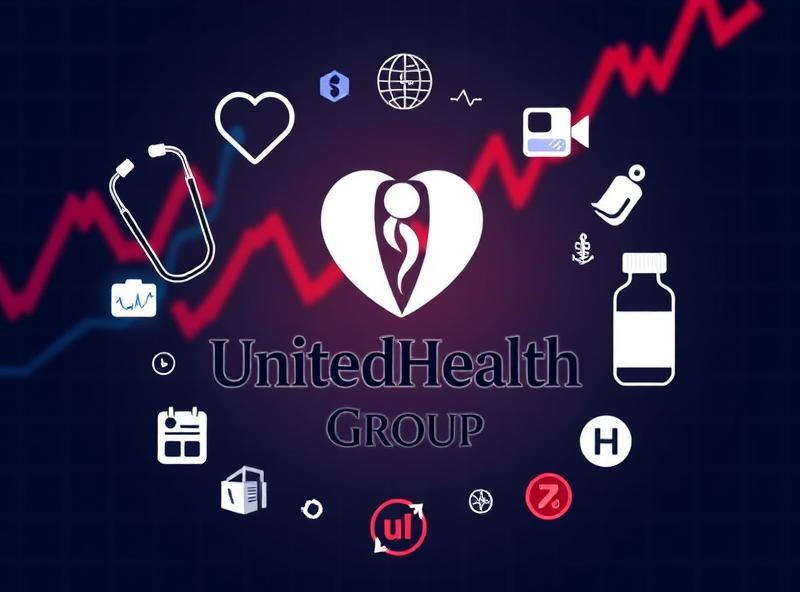
UnitedHealth Group (UNH): Is This Healthcare Giant a Healthy Addition to Your Portfolio?

about a company that sits at the very heart of the healthcare system for
millions: UnitedHealth Group Inc. (UNH). As one of the largest healthcare and
well-being companies globally, UNH plays a massive role in health insurance
and healthcare services. But what does this mean for you if you’re
considering adding UNH stock to your investment portfolio? Is this healthcare
giant a robust and promising investment, or are there complexities to
navigate in the ever-changing healthcare landscape? Let’s gently explore this
together with a kind and friendly curiosity.
UnitedHealth Group operates through two main business platforms:
UnitedHealthcare and Optum. UnitedHealthcare is the benefits side, providing
health insurance coverage to individuals, employers, and government programs
like Medicare and Medicaid. This segment is deeply involved in managing
healthcare costs and access for millions of members. Optum, on the other
hand, is the health services side, offering a wide range of services
including pharmacy benefit management (PBM), healthcare data analytics,
technology solutions, and direct patient care through its network of clinics
and physicians. This dual structure allows UNH to participate in both the
financing and delivery of healthcare, creating a powerful integrated
model.
Investing in a healthcare company like UnitedHealth Group means
investing in a sector that is fundamental to society and often considered
defensive, as healthcare needs persist regardless of economic conditions.
However, the healthcare industry is also highly complex, subject to
significant government regulation, political scrutiny, and rapidly evolving
market dynamics. Factors like healthcare policy changes, rising medical
costs, and competition from other insurers and service providers can all
impact UNH’s performance. Understanding the interplay between the insurance
and services segments, as well as the regulatory environment, is crucial for
evaluating UNH as an investment.
The aging population in many developed countries, particularly the
U.S., is a significant demographic trend that benefits UnitedHealth Group,
especially its Medicare Advantage plans. As more people enter retirement age,
the demand for healthcare services and related insurance coverage increases.
UNH is a leading provider in the Medicare Advantage market, which is a key
growth area for the company. Furthermore, the increasing complexity of
healthcare data and the need for efficient management of healthcare systems
drive demand for Optum’s services, including data analytics, technology, and
PBM. These long-term trends provide a favorable backdrop for UNH’s
business.
Based on information I have, UnitedHealth Group is a massive
company with a significant market presence. It is a component of major stock
indices like the Dow Jones Industrial Average, reflecting its status as a
blue-chip stock. Analyst sentiment towards UNH stock is generally positive.
According to a consensus of 25 analysts, the average rating for UNH stock is
“Buy.” The 12-month stock price forecast from 24 professional
analysts ranges from a low of USD 270 to a high of USD 700, with an average
analyst target price of USD 447.33. This average target suggests a potential
increase of 40.45% from a recent stock price. These analyst perspectives,
while not guarantees, indicate that many market professionals see significant
upside potential for UNH shares. The company’s large market capitalization,
recently noted around USD 420.58 billion, underscores its immense scale
within the healthcare sector.
UnitedHealthcare: The Insurance Powerhouse
The UnitedHealthcare segment is the largest health insurer in the
United States by revenue. It provides health benefit plans to a diverse
customer base, including employers of all sizes, individuals, and
beneficiaries of Medicare and Medicaid programs. This segment’s performance
is influenced by factors such as premium rates, medical cost trends,
enrollment levels, and government reimbursement policies. Managing medical
costs effectively while providing access to care is a constant challenge and
a key driver of profitability for this segment. The scale of
UnitedHealthcare’s operations gives it significant negotiating power with healthcare
providers, which is a competitive advantage.
Optum: The Growing Services Arm
The Optum segment has been a major growth engine for UnitedHealth
Group. It is a diversified health services business that includes Optum
Health (providing direct patient care through clinics and physicians), Optum
Insight (offering data analytics, technology, and consulting services to
healthcare providers and payers), and Optum Rx (a large pharmacy benefit
manager). The integration of these services with the insurance side
(UnitedHealthcare) allows UNH to create a more coordinated and potentially
more efficient healthcare experience. Optum’s focus on technology, data, and
value-based care models positions it well to capitalize on trends aimed at
improving healthcare quality and reducing costs. The growth of Optum has been
a key factor in UNH’s overall success and diversification beyond traditional
health insurance.
Market Trends and Growth Drivers
Several key market trends are driving demand for UnitedHealth
Group’s services. The aging population, as mentioned, increases enrollment in
Medicare plans. The increasing prevalence of chronic diseases drives demand
for healthcare services and care management programs. The shift towards
value-based care, which focuses on patient outcomes rather than just the
volume of services, creates opportunities for Optum’s data analytics and care
delivery models. Furthermore, the growing adoption of digital health
technologies and the need for better integration of healthcare data benefit
Optum’s technology and consulting services. These trends provide a strong
long-term growth runway for UNH.
Financial Performance and Stability
UnitedHealth Group has a strong track record of financial
performance, characterized by consistent revenue growth, robust
profitability, and strong cash flow generation. The company’s integrated
model, combining insurance and services, provides a degree of stability.
Revenue growth is driven by increasing enrollment in its health plans and the
expansion of Optum’s services. Profitability is influenced by medical cost
trends, operating efficiency, and the performance of its various business
lines. UNH is also known for returning value to shareholders through
dividends and share buybacks. The company has a history of increasing its
dividend, making it attractive to income-focused investors. Analyzing their
financial statements provides detailed insights into their operational
efficiency and financial health.
Regulatory and Political Landscape
The healthcare industry is heavily influenced by government
regulation and political decisions. Changes in healthcare policy, such as
reforms to the Affordable Care Act (ACA), changes in Medicare or Medicaid
reimbursement rates, or regulations impacting pharmacy benefit managers, can
significantly impact UnitedHealth Group’s business. The company is also
subject to antitrust scrutiny regarding its market position and acquisitions.
Investors in UNH need to pay attention to developments in healthcare policy
and the political environment, as these factors can introduce uncertainty and
risk. However, UNH’s size and expertise also give it a significant voice in
policy discussions.
Competition and Market Position
UnitedHealth Group operates in highly competitive markets. In
health insurance, it competes with other large national insurers like Anthem,
Aetna (part of CVS Health), Cigna, and Humana, as well as numerous regional
and local plans. In health services (Optum), it competes with a wide range of
companies offering PBM services, data analytics, technology solutions, and
healthcare delivery. UNH maintains its market leadership through its scale,
diversified business model, strong brand recognition, extensive network of
providers, and continuous investment in technology and services. However,
competition is intense, and maintaining market share requires continuous
innovation and efficient operations.
Challenges and Opportunities
Despite its strong position, UnitedHealth Group faces challenges.
These include managing rising healthcare costs, navigating complex and
changing regulations, intense competition, potential data security threats,
and public scrutiny over healthcare affordability and access. Integrating
acquisitions and managing a large, complex organization also present
operational challenges. However, significant opportunities exist in the
continued growth of government-sponsored healthcare programs (Medicare,
Medicaid), the expansion of Optum’s services into new areas and markets, the
increasing adoption of value-based care models, and leveraging technology and
data to improve healthcare outcomes and efficiency. The company’s ability to
capitalize on these opportunities while managing challenges will be key to
its future success.
Summary and Investment Insights
In summary, UnitedHealth Group (UNH) is a leading global
healthcare company with a powerful integrated business model encompassing
health insurance (UnitedHealthcare) and health services (Optum). The company
benefits from favorable demographic trends, particularly the aging
population, and the increasing demand for integrated healthcare solutions.
Recent analyst sentiment is generally positive, with a “Buy” rating
and an average price target suggesting potential upside. While operating in a
complex and highly regulated industry with significant competition, UNH’s
scale, diversification, financial strength, and focus on innovation provide a
strong foundation. Its status as a blue-chip stock and history of dividend
payments make it an attractive consideration for many
investors.
Investing in UNH means investing in a company that is deeply
embedded in the healthcare system. It’s a stock that might appeal to
investors seeking exposure to the healthcare sector, appreciating a company
with a diversified and integrated business model, and looking for potential
growth and shareholder returns. However, it’s essential to consider the
influence of regulatory changes, political factors, and the ongoing challenge
of managing healthcare costs. As always, ensure any investment decision
aligns with your personal financial situation, investment goals, and risk
tolerance. We hope this friendly overview has provided some helpful
insights!
Thank you for reading! Wishing you the very best in your
investment journey.







